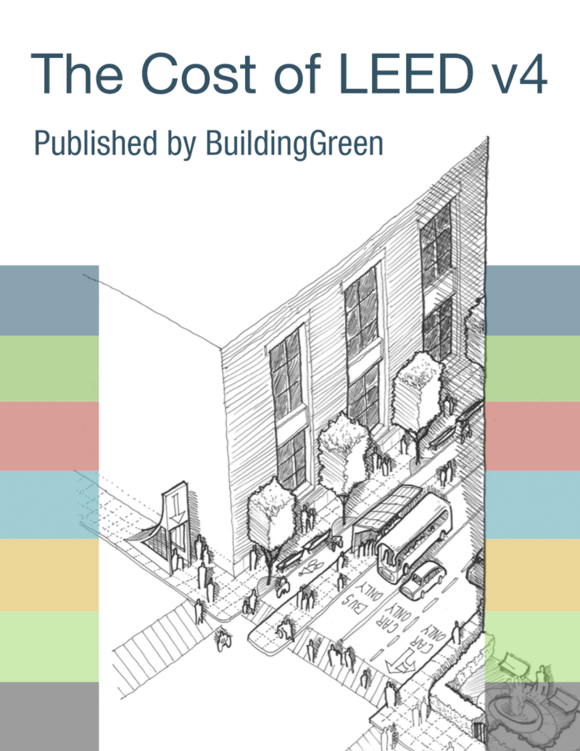LEEDuser’s viewpoint
Frank advice from LEED experts
LEED is changing all the time, and every project is unique. Even seasoned professionals can miss a critical detail and lose a credit or even a prerequisite at the last minute. Our expert advice guides our LEEDuser Premium members and saves you valuable time.
Credit language

© Copyright U.S. Green Building Council, Inc. All rights reserved.
Requirements
Establishment
Demonstrate one or both of the following for at least a portion of the building’s total energy use.- Total energy use is met directly with renewable energy systems.
- A minimum two-year contract is in place, with the commitment to renew on an ongoing basis, to purchase qualified resources that will be delivered at least annually. Resources must have come online after January 1, 2005.
Performance
Meet at least some of the building’s total energy use directly with renewable energy systems, or engage in a contract to purchase green power, carbon offsets, or Renewable Energy Certificates (RECs). Green power and RECs must be Green-e Energy Certified or the equivalent. [Europe ACP: Green Power] [India ACP: Green-e Energy Equivalent] RECs can be used only to mitigate the effects of Scope 2, electricity use. Carbon offsets may be used to mitigate Scope 1 or Scope 2 emissions on a metric ton of carbon dioxide–equivalent basis and must be Green-e Climate certified, or the equivalent. For U.S. projects, the offsets must come from greenhouse gas emissions reduction projects within the U.S. Use the following equation to calculate credit, up to the 5-point limit:Points = |
Renewable energy generated % |
+ |
Energy purchased/offset % (Not to exceed 100%) |
1.5% |
25% |
Alternative Compliance Paths (ACPs)
Europe ACP: Green-e Energy Equivalent
Projects in Europe may use the following approved standards in place of Green-e Energy:- EKOenergy
- Guarantees of Origin (GOs) with additional parameters
India ACP: Green-e Energy Equivalent
Projects in India may use RECs from India with additional parameters in place of Green-e Energy certified RECs. See all forum discussions about this credit »What does it cost?
Cost estimates for this credit
On each BD+C v4 credit, LEEDuser offers the wisdom of a team of architects, engineers, cost estimators, and LEED experts with hundreds of LEED projects between then. They analyzed the sustainable design strategies associated with each LEED credit, but also to assign actual costs to those strategies.
Our tab contains overall cost guidance, notes on what “soft costs” to expect, and a strategy-by-strategy breakdown of what to consider and what it might cost, in percentage premiums, actual costs, or both.
This information is also available in a full PDF download in The Cost of LEED v4 report.
Learn more about The Cost of LEED v4 »Frequently asked questions
Where can I find the current cost for RECs and carbon offsets?The answer to this question is available to LEEDuser premium members. Start a free trial » (If you're already a premium member, log in here.) |
Can I buy RECs on the open market, or do I have to go through my power provider or utility, which also offers them?The answer to this question is available to LEEDuser premium members. Start a free trial » (If you're already a premium member, log in here.) |
The owner has purchased RECs for a percentage of energy use for their entire building portfolio. Can we use the purchase to earn this credit for a single LEED building?The answer to this question is available to LEEDuser premium members. Start a free trial » (If you're already a premium member, log in here.) |
Addenda
In the first sentence under Requirements, delete "that have come online since January 1, 2005..." At the end of that paragraph, add the following sentence: "Resources must have come online within fifteen years of contract or purchase date."
For O+M Renewable Energy and Carbon Offsets Credit:
In the second bullet point under the Establishment section of Requirements, replace "Resources must have come online after January 1, 2005" with: "Resources must have come online within fifteen years of contract or purchase date."
"Projects in Canada can either buy Green-e certified products or use RECs from Canadian facilities that meet the eligible renewable definition and are generated at facilities certified by the EcoLogo Program (ecologo.org)."
Replace the definition of Scope 1 emissions with the following: "Scope 1 emissions direct greenhouse gas emissions from sources owned or controlled by the entity, such as emissions from fossil fuels burned on site. Electricity produced on site through the burning of fossil fuels is measured by the Scope 1 emissions associated with that fossil fuel."
Replace the definition of Scope 2 emissions with the following: "Scope 2 emissions indirect greenhouse gas emissions associated with the generation of purchased electricity, heating/cooling, or steam off site, through a utility provider for the entity’s consumption. Transmission and distribution losses related to hot water, chilled water, and steam are included in Scope 2 emissions, but transmission and distribution losses associated with electricity are not included."
In ID+C delete Table 2 and Table 3
In O+M delete Table 1 and Table 2
Documentation toolkit
The motherlode of cheat sheets
LEEDuser’s Documentation Toolkit is loaded with calculators to help assess credit compliance, tracking spreadsheets for materials, sample templates to help guide your narratives and LEED Online submissions, and examples of actual submissions from certified LEED projects for you to check your work against. To get your plaque, start with the right toolkit.
Get the inside scoop
Our editors have written a detailed analysis of nearly every LEED credit, and LEEDuser premium members get full access. We’ll tell you whether the credit is easy to accomplish or better left alone, and we provide insider tips on how to document it successfully.

© Copyright U.S. Green Building Council, Inc. All rights reserved.
Requirements
Establishment
Demonstrate one or both of the following for at least a portion of the building’s total energy use.- Total energy use is met directly with renewable energy systems.
- A minimum two-year contract is in place, with the commitment to renew on an ongoing basis, to purchase qualified resources that will be delivered at least annually. Resources must have come online after January 1, 2005.
Performance
Meet at least some of the building’s total energy use directly with renewable energy systems, or engage in a contract to purchase green power, carbon offsets, or Renewable Energy Certificates (RECs). Green power and RECs must be Green-e Energy Certified or the equivalent. [Europe ACP: Green Power] [India ACP: Green-e Energy Equivalent] RECs can be used only to mitigate the effects of Scope 2, electricity use. Carbon offsets may be used to mitigate Scope 1 or Scope 2 emissions on a metric ton of carbon dioxide–equivalent basis and must be Green-e Climate certified, or the equivalent. For U.S. projects, the offsets must come from greenhouse gas emissions reduction projects within the U.S. Use the following equation to calculate credit, up to the 5-point limit:Points = |
Renewable energy generated % |
+ |
Energy purchased/offset % (Not to exceed 100%) |
1.5% |
25% |
Alternative Compliance Paths (ACPs)
Europe ACP: Green-e Energy Equivalent
Projects in Europe may use the following approved standards in place of Green-e Energy:- EKOenergy
- Guarantees of Origin (GOs) with additional parameters
India ACP: Green-e Energy Equivalent
Projects in India may use RECs from India with additional parameters in place of Green-e Energy certified RECs.In the end, LEED is all about documentation. LEEDuser’s Documentation Toolkit, for premium members only, saves you time and helps you avoid mistakes with:
- Calculators to help assess credit compliance.
- Tracking spreadsheets for materials purchases.
- Spreadsheets and forms to give to subs and other team members.
- Guidance documents on arcane LEED issues.
- Sample templates to help guide your narratives and LEED Online submissions.
- Examples of actual submissions from certified LEED projects.
Where can I find the current cost for RECs and carbon offsets?The answer to this question is available to LEEDuser premium members. Start a free trial » (If you're already a premium member, log in here.) |
Can I buy RECs on the open market, or do I have to go through my power provider or utility, which also offers them?The answer to this question is available to LEEDuser premium members. Start a free trial » (If you're already a premium member, log in here.) |
The owner has purchased RECs for a percentage of energy use for their entire building portfolio. Can we use the purchase to earn this credit for a single LEED building?The answer to this question is available to LEEDuser premium members. Start a free trial » (If you're already a premium member, log in here.) |
In the first sentence under Requirements, delete "that have come online since January 1, 2005..." At the end of that paragraph, add the following sentence: "Resources must have come online within fifteen years of contract or purchase date."
For O+M Renewable Energy and Carbon Offsets Credit:
In the second bullet point under the Establishment section of Requirements, replace "Resources must have come online after January 1, 2005" with: "Resources must have come online within fifteen years of contract or purchase date."
"Projects in Canada can either buy Green-e certified products or use RECs from Canadian facilities that meet the eligible renewable definition and are generated at facilities certified by the EcoLogo Program (ecologo.org)."
Replace the definition of Scope 1 emissions with the following: "Scope 1 emissions direct greenhouse gas emissions from sources owned or controlled by the entity, such as emissions from fossil fuels burned on site. Electricity produced on site through the burning of fossil fuels is measured by the Scope 1 emissions associated with that fossil fuel."
Replace the definition of Scope 2 emissions with the following: "Scope 2 emissions indirect greenhouse gas emissions associated with the generation of purchased electricity, heating/cooling, or steam off site, through a utility provider for the entity’s consumption. Transmission and distribution losses related to hot water, chilled water, and steam are included in Scope 2 emissions, but transmission and distribution losses associated with electricity are not included."
In ID+C delete Table 2 and Table 3
In O+M delete Table 1 and Table 2


